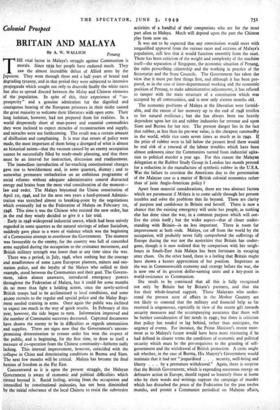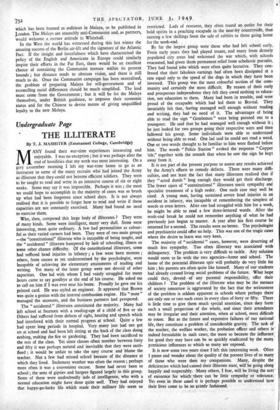Colonial Prospect
BRITAIN AND MALAYA
THE vital factor in Malaya's struggle against Communism is morale. Since 1939 her people have endured much. They saw the almost incredible defeat of Allied arms by the Japanese. They went through three and a half years of brutal and degrading tyranny, and in that period they were subjected to intensive propaganda which sought not only to discredit finally the white races but also to spread discord between the Malay and Chinese elements of the ' population. In spite of this, their experience of " co- prosperity " and a genuine admiration for the dignified and courageous bearing of the European prisoners in their midst caused the great majority to welcome their liberators with open arms. Their long isolation, however, had not prepared them for realities. In a world desperately short of man-power and essential commodities they were inclined to expect miracles of reconstruction and supply, and miracles were not forthcoming. The result was a certain amount of disillusion and complaining. It is true that errors of policy were made, the most important of them being a disregard of what is almost an historical axiom—that the vacuum caused by an enemy occupation cannot be successfully filled by ready-made planning, and that there must be an interval for instruction, discussion and readjustment.
The immediate introduction of far-reaching constitutional changes gave rise to bewilderment and, in some quartet* dismay ; and to somewhat premature embarkation on an ambitious programme of social reforms without adequate administrative control distracted energy and brains from the most vital consideration of the moment— law and order. The Malays boycotted the Union constitution of April 1st, 1946, and for the next two years a hard-pressed Adminis- tration was stretched almost to breaking-point by the negotiations which eventually led to the Federation of Malaya on February 1st, 1948. This time it was the Chinese who resisted the new order, but in the end they wisely decided to give it a fair trial.
Early in 1948 widespread industrial unrest, which had been naïvely regarded in some quarters as the natural stirrings of infant Socialism, suddenly gave place to a wave of violence which was the beginning of a Communist attempt to overthrow the Government. The moment was favourable to the enemy, for the country was full of concealed arms supplied during the occupation to the resistance movement, and British military strength was lower than at any time since the war.
There was a period, in July, 1948, when nothing but the courage and steadfastness of some 2,000 European planters, miners and out- station police, and the loyalty of the Malays who rallied to their example, stood between the Communists and their goal. The Govern- ment, taken almost unawares, introduced emergency powers throughout the Federation of Malaya, but it could for some months do no more than fight a holding action, since the newly-arrived British troops had to be acclimatised to local conditions, and some 40,000 recruits to the regular and special police and the Malay Regi- ment needed training in arms. Once again the public was inclined to expect too much in the way of quick results. In February of this year, however, the tide began to turn. Information improved and the number of Communist successes decreased. Captured documents have shown the enemy to be in difficulties as regards ammunition and supplies. There are signs now that the Government's uncom- promising determination to restore order has won the respect of the public, and is beginning, for the first time, to draw to itself a measure of co-operation from the Chinese community—hitherto sadly lacking. This internal improvement, however, coincided with the collapse in China and deteriorating conditions in Burma and Siam. The next few months will be critical. Malaya has become the final bastion of freedom in the Far East.
Concentrated as it is upon the present struggle, the Malayan Government is aware of economic and political difficulties which extend beyond it. Racial feeling, arising from the occupation and intensified by constitutional jealousies, has not been diminished by the initial reluctance of the local Chinese to resist the subversive
activities of a handful of their compatriots who are for the most part alien to Malaya. Much will depend upon the part the Chinese play from now on.
It was not to be expected that any constitution would meet with unqualified approval from the various races and sections of Malaya's population, still less that it would function smoothly from the start. There has been criticism of the weight and complexity of the machine itself—the separation of Singapore, the economic situation of Penang, the rules prescribing citizenship and the working in practice of the Secretariat and the State Councils. The Government has taken the view that it must put first things first, and although it has been pre- pared, as in the case of inter-departmental working and the economic position of Penang, to make administrative adjustments, it has refused to tamper with the main structure of a constitution which was accepted by all communities, and is now only sixteen months old.
The economic problems of Malaya at the liberation were formid- able, and the extent of her recovery up to the end of 1948 testifies to her natural resilience ; but she has always been too heavily dependent upon her tin and rubber industries for revenue and upon Siam and Burma for her rice. The present danger lies in the fact that rubber, at less than its pre-war value, is the cheapest commodtty in the world, while rice costs seven times as much as in 1940. IC the price of rubber were to fall below the present level there would be real risk of a renewal of the labour troubles which have been almost unknown since the Communists turned from industrial agita- tion to political murder a year ago. For this reason the Malayan delegation at the Rubber Study Group in London last month pressed for a reduction in the manufacture of synthetic rubber in the U.S.A. Was the failure to convince the Americans due to the presentation of the Malayan case as a matter of British colonial economics rather than of joint Anglo-American policy ?
Apart from material considerations, there are two abstract factors which are paramount if Malaya is to come safely through her present troubles and solve the problems that lie beyond. These are clarity of purpose and confidence in Britain and herself. There is now a chance that the existing emergency will unite her people, as nothing else has done since the war, in a common purpose which will out- live the crisis itself ; but the wider aspect—that of closer under- standing with Britain—is no less important. There is room for improvement at both ends. Malaya, cut off from the world by the occupation, will probably never fully comprehend the sufferings of Europe during the war nor the austerities that Britain has under- gone, though it is now realised that by comparison with her neigh- bours in South-East Asia Malaya has been fortunate in escaping utter chaos. On the other hand, there is a feeling that Britain might have shown a keener appreciation of her position. Important as she was in Commonwealth economy and strategy before the war, she is now one of its greatest dollar-earning units and a key-point in world-resistance to Communism.
She needs to be convinced that all this is fully recognised not only by Britain but by Britain's partners, and that she has their whole-hearted support. Those Malayans who under- stand the present state of affairs in the Mother Country are not likely to contend that the military and financial help so far received is ungenerous, especially in view of the recent gift towards security measures and the accompanying assurance that there will be further consideration of her needs in 1949; but there is criticism that policy has tended to lag behind, rather than anticipate, the urgency of events. For instance, the Prime Minister's recent state- ment as to Malaya's future would have been more reassuring if he had defined in clearer terms the conditions of economic and political security which must be the pre-requisites to the granting of self- government and the withdrawal of British protection. A cynic might ask whether, in the case of Burma, His Majesty's Government would maintain that it had not "jeopardised . . . security, well-being and liberty . . . by a premature withdrawal." Again, there is surprise that the British Government, which is expending enormous energy on defensive action in Europe, should regard so leniently those at home who by their words and writings support the campaign of murder which has disturbed the peace of the Federation for the past twelve months, and permit a Communist periodical on Malayan affairs,
which has been banned as seditious in Malaya, to be published in X.ondon. The Malays are staunchly anti-Communist and, as partners, would welcome a. sterner attitude in Whitehall.
In the West the world has witnessed during this last winter the amazing success of the Berlin air-lift and the signature of the Atlantic Pact. If the insight and forcefulness which have characterised the policy of the English and Americans in Europe could similarly inspire their efforts in the Far East, there would be an excellent chance of containing the Communist menace within its present bounds ; but distance tends to obscure vision, and there is still much to do. Once the Communist campaign has been neutralised, the problem of preparing Malaya for self-government and of reconciling racial differences should be much simplified. The lead must come from the Government ; but it will be for the Malays themselves, under British guidance, to improve their economic status and for the Chinese to devise means of giving unqualified loyalty to the new Malaya.



































 Previous page
Previous page